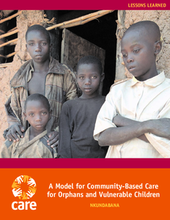CARE Rwanda’s Nkundabana (Kinyarwanda for “I love children,”) approach provides a community-based solution to the overwhelming problem of child-headed households (CHHs) and households in which adults are unable to provide adequate care for children. Challenged by the impact of civil war, genocide and HIV/AIDS, Rwanda is confronted with one of the highest percentages of orphans in the world. Communities already overburdened by social fragmentation, loss of labor from the HIV/AIDS pandemic, and crippling poverty are unprepared to care for the children left behind. Even the capacity of extended family members to absorb orphaned children often reaches its limits; in far too many cases, children are left to their own devices.
The Nkundabana model mobilizes adult volunteers from the community - Nkundabana - to provide guidance and care for children living in households without adult support. Trained and supported by CARE in counseling, active listening, and life skills instruction, these volunteers provide the best alternative for children with no adult family members available for guidance and care.
By making regular visits, Nkundabana can encourage children to attend school or seek medical assistance, as well as provide an important emotional outlet in the form of psychosocial support. The Nkundabana model provides a foundation for establishing economic and food security, a basis from which advocacy and child protection functions can be initiated. The model has excellent potential for long-term sustainability, as communities are supported to come together for the care of children in their midst.

